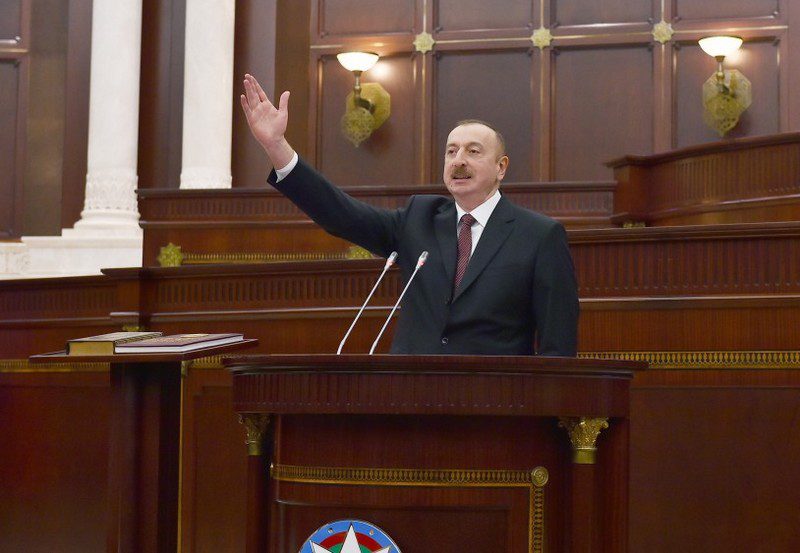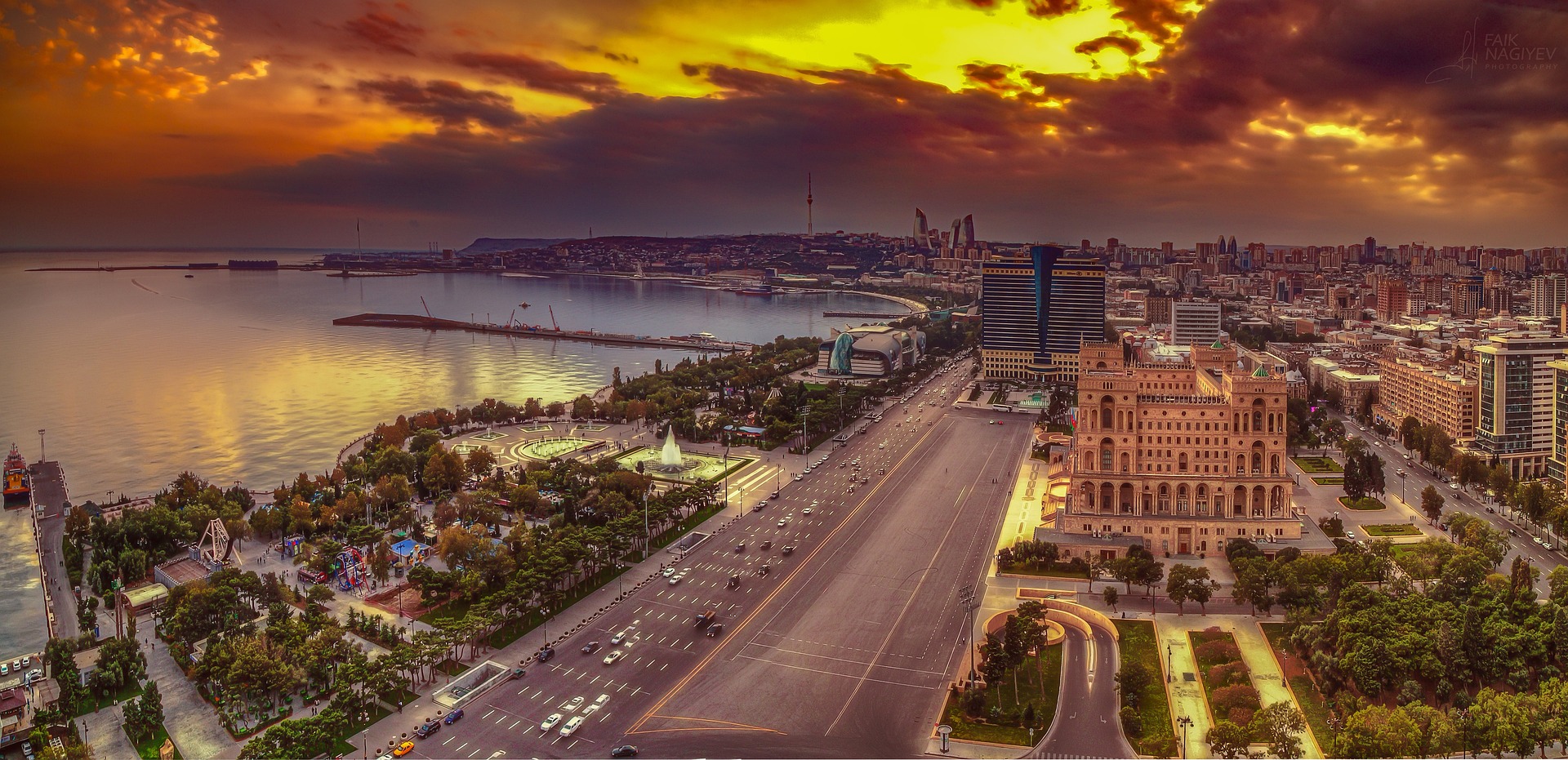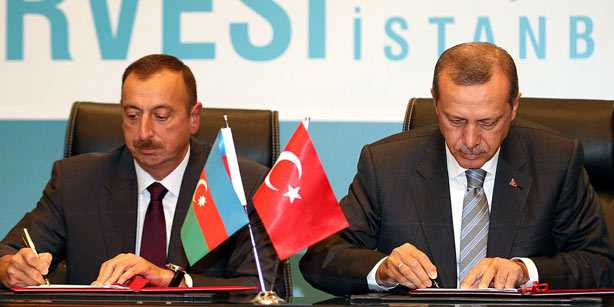
On December 29, President of the Republic of Azerbaijan Ilham Aliyev was interviewed by Azerbaijan Television at Heydar Aliyev International Airport.
AZERTAC presents the interview.
Journalist: Hello Mr. President.
President Ilham Aliyev: Hello.
Journalist: Unfortunately, an event that deeply shocked all of us occurred in recent days. On 25 December, an AZAL plane flying from Baku to Grozny crashed near the city of Aktau, Kazakhstan. We would like to know your thoughts on how subsequent developments unfolded.
President Ilham Aliyev: I received information about this while on the plane flying to St. Petersburg to participate in the CIS Summit. I was informed and immediately ordered that the plane should return to Baku. As soon as I arrived in Baku, I held an operational meeting at the airport. While I was still on the way to Baku, a State Commission was established on my instruction, and a delegation consisting of representatives of relevant agencies was immediately dispatched to the city of Aktau. Because they had to start work immediately. First of all, they had to get acquainted with the condition of the plane’s remains, conduct on-site observations, obtain video and photo footage, and present them to the public.
Additionally, a group of Azerbaijani doctors was dispatched to Aktau, although the Kazakh side spared no effort to treat the wounded and provide them with medical care. At the same time, the Prosecutor General’s Office of Azerbaijan started a criminal case on my instructions, and I know that similar steps were taken both in Kazakhstan and in Russia. Of course, work has begun on the initial theories. Of course, the final version will become clear after the black boxes have been examined. However, the initial theories are also quite reasonable and are based on facts. The facts indicate that the Azerbaijani civilian plane was damaged from the outside over Russian territory, near the city of Grozny, and almost lost control. We also know that means of electronic warfare put our plane out of control. This was the first impact on the plane. At the same time, as a result of fire from the ground, the tail of the plane was also severely damaged. Immediately, on the same day, our team captured this video footage from the city of Aktau and informed the public about it. The fact that the fuselage is riddled with holes indicates that the theory of the plane hitting a flock of birds, which was brought up by someone, is completely removed from the agenda. It is possible that when the plane was damaged, when it was hit, the pilot could have perceived it as a collision with birds. Because it would probably never have occurred to anyone that our plane might be fired at from the ground while flying over a country friendly to us. Unfortunately, however, some circles in Russia preferred to put forward this theory. Another regrettable and surprising moment for us was that official Russian agencies put forward theories about the explosion of a gas cylinder on board the plane. In other words, this clearly showed that the Russian side wanted to cover up the issue, which, of course, is unbecoming of anyone. Of course, our plane was hit by accident. Of course, there can be no talk of a deliberate act of terror here. Therefore, admitting guilt, apologizing in a timely manner to Azerbaijan, which is considered a friendly country, and informing the public about this – these were measures and steps that should have been taken. Unfortunately, for the first three days, we heard nothing from Russia except for some absurd theories.
Of course, the details of the accident will be fully investigated. I have no doubt about that. I must also note that Azerbaijan was in favor of a group of international experts engaging in this work from the very first day. The Russian side officially suggested to us that the Interstate Aviation Committee investigate this matter. But we categorically refused. The reason is clear. Because it is no secret that this organization consists mostly of Russian officials and is headed by Russian citizens. Objectivity factors could not be fully ensured here. If we had seen fair and reasonable steps by Russia in the immediate aftermath of the accident, we probably would not have objected. But we saw that attempts to cover up the case were quite obvious.
Therefore, we expressed this position in our close contacts both to the Kazakh side and the Russian side – a working group consisting of international experts only should be established, and it was. There are representatives of the aircraft manufacturer, Embraer, those of relevant Brazilian agencies, representatives of Azerbaijan, Kazakhstan, and Russia, including the Interstate Aviation Committee – not in leading roles, but simply as members of the working group. Let me repeat, after the flight recorders have been opened and we have obtained more detailed information, the full picture of what happened will be revealed and many questions that still remain outstanding today will be clarified. For example, why couldn’t the plane land in Grozny? To what extent did the means of radio-electronic warfare affect the plane’s controls? What was the extent of consequences of the strike and the explosion in the vicinity of the plane? Because I must also state that attempts to deny obvious facts and pull the wool over people’s eyes here are both nonsensical and absurd. Because fortunately, thanks to the heroism of the crew, an incident occurred that allowed the plane to land, even though it was an emergency landing. Many of the passengers survived, and their testimonies are available. The injuries inflicted on the passengers and crew by the shrapnel that pierced the plane are also obvious. Attributing this to a flock of birds or to the explosion of a gas cylinder is both foolish and dishonest. Therefore, we will find out why the plane could not land after the black boxes have been opened. When exactly was the plane fired at from the ground? Why didn’t the plane attempt to land at the nearest airports, which were Mineralnye Vody and Makhachkala? Was the plane sent to Aktau, or was this an objective choice? There are various hypotheses. Some believe that the plane was deliberately sent off course by ground handling services in Grozny because the plane was already out of control, and there was a high probability it would fall into the sea. If this had been the case, the cover-up attempts would have been successful, and the so-called bird theory would have been presented as the most likely version. According to some experts, Aktau was chosen because it is located in an open space, residential areas are far from the airport, and the crew of the plane could have assumed that this would be an emergency landing and chose a more suitable place for it. On the other hand, however, with nearby airports available, it was riskier for an uncontrollable plane to fly further, especially over the sea. In other words, there are no answers to all these questions yet. We, the Azerbaijani side, and I personally are trying to be as fair as possible. We do not want to express an opinion on unclear issues before they are fully clarified. However, we must, we do, and we will state our opinion with full determination on obvious issues. I said in my remarks here at the airport on the day of the accident that the Azerbaijani public will be regularly updated on this issue, and on the progress of this investigation, and that it is.
– Mr. President, how would you assess the performance of the aircraft crew?
– Very highly. I attended the farewell ceremony today and expressed my condolences to the relatives of the deceased crew members. Today, I will issue an order awarding the crew members. I highly appreciate their performance, professionalism, and dedication. The pilots and the entire crew showed true heroism. The pilots showed both professionalism and heroism in controlling the plane that was out of control in various ways. Of course, they were experienced pilots and knew that they would not be able to survive this emergency landing. However, they displayed tremendous heroism to save the passengers, and it is thanks to them that there are survivors in this plane crash. It is thanks to them that a section of the fuselage did not burn, and it is thanks to them that we can clearly say today that the plane was shot down by Russia. This is a fact, and no-one can deny this fact. Again, we are not saying that this was done intentionally, but it was done.
The pilots and crew members showed both professionalism and composure. I must specifically acknowledge the female crew members. They themselves were in a state of stress, but look how humanely they acted to calm the passengers and prevent chaos inside the plane. Their actions, I repeat, will be duly acknowledged by the Azerbaijani state. May Allah rest the souls of the deceased crew members and all those who died in peace. We wish the survivors a speedy recovery. Most of the survivors are already in Baku. They received immediate treatment in Kazakhstan. Some are still receiving treatment and will be evacuated to Azerbaijan as soon as possible.
– Mr. President, you phoned the President of Kazakhstan, Kassym-Jomart Tokayev. We would like to know your opinion on the issues discussed. In general, how would you evaluate the joint activity of Azerbaijani and Kazakh government officials working together on this issue?
– Yes, first of all, I called to express my gratitude to President Tokayev. Because we knew, and had received information, that as soon as the accident occurred, Kazakh rescuers immediately arrived at the scene and began to pull people out of the destroyed fuselage. They put their own lives at risk. Because they did not know whether there would be another explosion or not. A part of the plane had burned, and the other part could have caught fire as well. But despite this, they showed true heroism. At the same time, the activities of the medical teams were also very valuable. Because the injured passengers were immediately taken to medical facilities, and I expressed my gratitude to President Tokayev for this. I know that the demonstration of solidarity by our Kazakh brothers and sisters also left a great mark in the hearts of the Azerbaijani people. Ordinary people went to our consulate in Aktau, laid flowers, and expressed their attitude and solidarity with us. This is what true friendship and brotherhood are like. During my conversation with President Tokayev, I also expressed Azerbaijan’s position on the investigation and brought to his attention the issues I have just mentioned – that we are in favor of international examination and in no way can we put this issue at the disposal of the Interstate Aviation Committee. This position was also met with understanding. Of course, representatives of our government institutions, members and heads of the commission, and representatives of the prosecutor’s office are constantly in touch. Kazakhstan, in turn, has also created a State Commission, and President Tokayev informed me about this during the conversation. They also want and are trying to ensure that the issue is fully disclosed, of course. At the same time, I also expressed my condolences to President Tokayev because six citizens of Kazakhstan died as a result of the accident. He also expressed his condolences to me. In other words, no matter how serious the incident was, it was also a test. In other words, how will anyone come out of this test? I am glad that despite this tragedy, I see and am sure that people in Kazakhstan share the same opinion. Our friendship and brotherhood have become even stronger after this difficult situation.
– In the aftermath of the accident, AZAL suspended flights to some Russian cities. What was the reason for this decision and how are things going now?
– I gave this instruction, and the main reason for this, of course, is the issue of safety. Because airspace in many Russian cities is occasionally closed, and a special operating regime is applied there. They call this a “Kovyor (carpet) operation,” and returning to what I mentioned in the first question, I must also mention that one other thing must also be clarified: when was that “Kovyor operation” announced? Because according to the information on our hands, that “Kovyor operation” was announced only after our plane had been exposed to external influence. If this is the case, it once again shows that local services did this to cover up the issue.
As for AZAL flights, AZAL has indefinitely suspended its flights to seven Russian cities. At the same time, we have also suspended flights of Russian airlines from three Russian cities to Azerbaijan. Our air connection with a total of 10 cities has now been suspended, and let me repeat that, first of all, security issues are at the forefront here. We have always considered the safety of our passengers a priority, and this situation has been declared. Whatever we do, we do it openly. Let me repeat, this decision has been made. When will these flights be resumed, especially to the city of Grozny? Most likely, they will not. Life will tell, and the security of Russian airspace will certainly be taken into account.
– Mr. President, what are Azerbaijan’s expectations and demands from Russia in general in connection with what happened?
– We have clearly expressed our demands to the Russian side. These demands were officially communicated to them on 27 December. What do these demands consist of? First of all, the Russian side must apologize to Azerbaijan. Secondly, it must acknowledge its guilt. Thirdly, those responsible must be punished, brought to criminal responsibility, and compensation must be paid to the Azerbaijani state, to the injured passengers and crew members. These are our conditions. The first of these was fulfilled yesterday. I do hope that the other conditions will also be accepted. All these conditions are fair. There are no extraordinary demands or issues here; all of this is based on international experience and normal human conduct. That’s it. I repeat, the Azerbaijani public is and will be informed about all sides of the issue. The conditions I mentioned are conveyed to the public through you, of course, and I repeat, I do hope that our conditions are accepted.
– Thank you very much, Mr. President. We are grateful for your detailed answers to our questions.
– Thank you.




